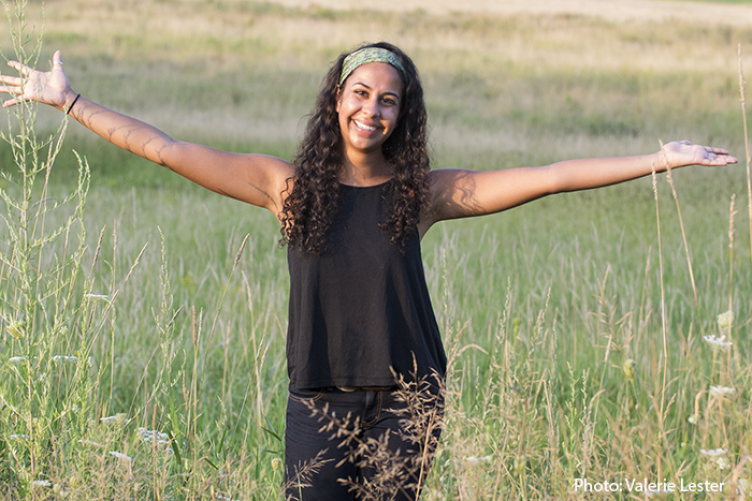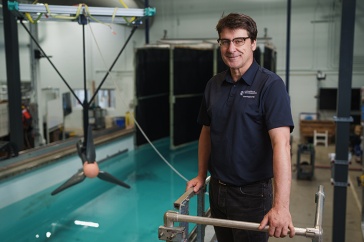
When Alexandra Philip ’15 emerged from the plane after the 14-hour flight from Boston to Auckland, any apprehension she had about arriving in a foreign place where she knew no one melted away the minute the music started. A group of Māori singers and dancers were at the gate performing the traditional Haka to welcome Lorde, the pop star and New Zealand native who returned home on the same plane as Philip after winning a Grammy in the U.S. But it may as well have been a welcome for Philip, who had arrived to participate in EcoQuest, a 15-week, UNH-affiliated study abroad program geared toward the conservation-minded. And the work she was poised to do would directly affect Māori people.
We asked Philip about her adventure.
UNH Today: Tell us about EcoQuest.
Philip: It’s not your typical study abroad program. There are 22-30 students from UNH and other schools in the U.S. who go there and live in a sustainable community in Kaiaua, New Zealand. You spend 10 weeks traveling all across New Zealand and delving into different environmental topics in ecology and sustainability, and in the final five weeks you do a directed research project. I worked with two other EcoQuest students on that project.
UNH Today: What was your project?
Philip: We did a wetland restoration project on the Rangipo Wetland, which is on the Miranda Kaiaua coast. This wetland is geologically significant and there’s a huge shore bird nesting site on it. The land is significant to Māori people because it once belonged to them. When the Europeans arrived about 200 years ago, they took over Māori land. Our job was to create a restoration plan to revert this piece of land to its historical use.

UNH Today: Describe the Rangipo Wetland for us.
Philip: When you think of wetland around here, you think of a nice swampy area, healthy and natural. But when we got out there and looked at it—it just looked like a grass field, like something you would graze cattle on. A few streams ran through it, but it wasn’t what you would traditionally think of as a wetland. Hopefully when we plant plants that will hold water better it will become a better wetland.
UNH Today: How were Māori people involved in your work?
Philip: We interacted with Māori people a lot because of their involvement in the restoration. They told us which plants they wanted on the site, like flax, for example, which is a plant they use for weaving. They use the plant raupo for building, so they wanted that there, as well.
That was a big part of our program—actually living with Maori and talking to them. We were invited onto a marae (meeting area), which is something many New Zealanders don’t get the opportunity to experience, let alone tourists. It’s their way of saying, “Welcome. We’re happy you’re here. You’re part of this family now and you’re part of this community now.” They do a whole formal ceremony. It’s a cool cultural experience and it also makes you feel like New Zealand is a place that is home to you.
UNH Today: Was there a language barrier?
Philip: They speak Māori. They also speak English. We learned a little bit of Māori. We stayed overnight one night. We had a few meals with them at different maraes. They were definitely a big part of our program.
UNH Today: What are Māori people like?
Philip: Song is a really big part of their culture. When we were in a formal meeting, a powhiri, they would speak, and then they would sing a song to us. Then the speaker for our group, Jono Clark, who is one of the directors of EcoQuest in New Zealand, would speak back to them, and we would sing a song to them.

UNH Today: What did your work entail?
Philip: The first goal of our directed research project was to look at the land and see what was there. How many native plants? How’s the water quality? How’s it being used right now? We saw a lot of invasive plants, and overall, the wetland is not in great health right now. Cows have been walking on it for years. There is manure in the water. It’s just not particularly healthy.
We gathered a lot of information and built a 10-year restoration plan that describes how the wetland should be planted, the types of plants that should be used, where to get the plants, how they should be phased in, and how to include walking trails so people in the community can use this piece of land and benefit from the work that we’ve done. We addressed how to get rid of the invasive plants, how to manage the cattle, how to eventually remove the cattle from this wetland for good. You can’t do it immediately because they’re part of managing the invasive plants right now—they eat them and keep them down. That’s good for the time being, but they will eventually eat the native plants, so as we replant an area we’re hoping to move the cattle out of that area.
UNH Today: What was the end result of all that work?
Philip: We ended up with an 80-page report that we collaborated on and presented to all of EcoQuest. The DOC was really happy with our work. They were excited that we had done this for them because their time is limited. It definitely was a successful project.

UNH Today: How has your perspective changed, if at all?
Philip: It changes your whole life when you go abroad to a place that’s so different. My perspective changed on living sustainably. Community living has so many benefits you don’t really see until you’re forced to wash the dishes with the same people every night, go to class, hang out on weekends. You learn a lot from these people. I think that everyone has something to offer to you. And, you can’t be so quick to judge people. You have to be open to pretty much whatever people have to offer because anything that people bring to you is a gift, and I was just really, really blessed to get to know these people.
And, also, on not as deep a level, learning to compost, make my own food, garden, hang my clothing on a line...It seems so ridiculous when you’re here in the U.S., but when you’re there it makes sense. It’s easy. So, I’m bringing that back into my everyday life when I can.
Photo slideshow narrated by Ally Philip

-
Compiled By:
Valerie Lester | Communications and Public Affairs | valerie.lester@unh.edu | (603) 862-2632

















































